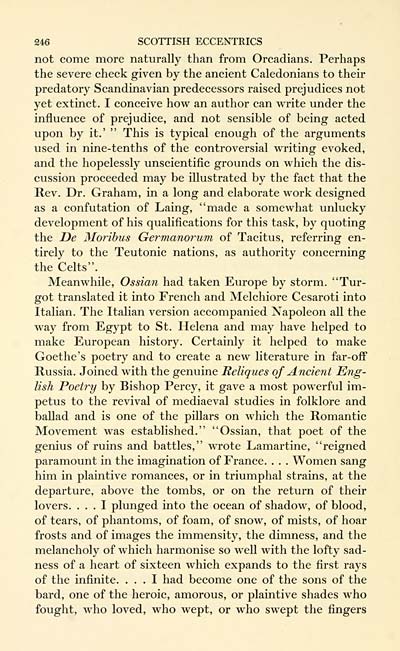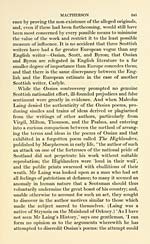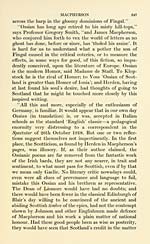Ossian Collection > Scottish eccentrics
(262)
Download files
Complete book:
Individual page:
Thumbnail gallery: Grid view | List view

246 SCOTTISH ECCENTRICS
not come more naturally than from Orcadians. Perhaps
the severe check given by the ancient Caledonians to their
predatory Scandinavian predecessors raised prejudices not
yet extinct. I conceive how an author can write under the
influence of prejudice, and not sensible of being acted
upon by it.' " This is typical enough of the arguments
used in nine-tenths of the controversial writing evoked,
and the hopelessly unscientific grounds on which the dis-
cussion proceeded may be illustrated by the fact that the
Rev. Dr. Graham, in a long and elaborate work designed
as a confutation of Laing, "made a somewhat unlucky
development of his qualifications for this task, by quoting
the De Moribus Germanorum of Tacitus, referring en-
tirely to the Teutonic nations, as authority concerning
the Celts".
Meanwhile, Ossian had taken Europe by storm. "Tur-
got translated it into French and Melchiore Cesaroti into
Italian. The Italian version accompanied Napoleon all the
way from Egypt to St. Helena and may have helped to
make European history. Certainly it helped to make
Goethe's poetry and to create a new literature in far-off
Russia. Joined with the genuine Reliques of Ancient Eng-
lish Poetry by Bishop Percy, it gave a most powerful im-
petus to the revival of mediaeval studies in folklore and
ballad and is one of the pillars on which the Romantic
Movement was established." "Ossian, that poet of the
genius of ruins and battles," wrote Lamartine, "reigned
paramount in the imagination of France. . . . Women sang
him in plaintive romances, or in triumphal strains, at the
departure, above the tombs, or on the return of their
lovers. ... I plunged into the ocean of shadow, of blood,
of tears, of phantoms, of foam, of snow, of mists, of hoar
frosts and of images the immensity, the dimness, and the
melancholy of which harmonise so well with the lofty sad-
ness of a heart of sixteen which expands to the first rays
of the infinite. ... I had become one of the sons of the
bard, one of the heroic, amorous, or plaintive shades who
fought, who loved, who wept, or who swept the fingers
not come more naturally than from Orcadians. Perhaps
the severe check given by the ancient Caledonians to their
predatory Scandinavian predecessors raised prejudices not
yet extinct. I conceive how an author can write under the
influence of prejudice, and not sensible of being acted
upon by it.' " This is typical enough of the arguments
used in nine-tenths of the controversial writing evoked,
and the hopelessly unscientific grounds on which the dis-
cussion proceeded may be illustrated by the fact that the
Rev. Dr. Graham, in a long and elaborate work designed
as a confutation of Laing, "made a somewhat unlucky
development of his qualifications for this task, by quoting
the De Moribus Germanorum of Tacitus, referring en-
tirely to the Teutonic nations, as authority concerning
the Celts".
Meanwhile, Ossian had taken Europe by storm. "Tur-
got translated it into French and Melchiore Cesaroti into
Italian. The Italian version accompanied Napoleon all the
way from Egypt to St. Helena and may have helped to
make European history. Certainly it helped to make
Goethe's poetry and to create a new literature in far-off
Russia. Joined with the genuine Reliques of Ancient Eng-
lish Poetry by Bishop Percy, it gave a most powerful im-
petus to the revival of mediaeval studies in folklore and
ballad and is one of the pillars on which the Romantic
Movement was established." "Ossian, that poet of the
genius of ruins and battles," wrote Lamartine, "reigned
paramount in the imagination of France. . . . Women sang
him in plaintive romances, or in triumphal strains, at the
departure, above the tombs, or on the return of their
lovers. ... I plunged into the ocean of shadow, of blood,
of tears, of phantoms, of foam, of snow, of mists, of hoar
frosts and of images the immensity, the dimness, and the
melancholy of which harmonise so well with the lofty sad-
ness of a heart of sixteen which expands to the first rays
of the infinite. ... I had become one of the sons of the
bard, one of the heroic, amorous, or plaintive shades who
fought, who loved, who wept, or who swept the fingers
Set display mode to: Large image | Transcription
Images and transcriptions on this page, including medium image downloads, may be used under the Creative Commons Attribution 4.0 International Licence unless otherwise stated. ![]()
| Early Gaelic Book Collections > Ossian Collection > Scottish eccentrics > (262) |
|---|
| Permanent URL | https://digital.nls.uk/81911488 |
|---|
| Description | Selected books from the Ossian Collection of 327 volumes, originally assembled by J. Norman Methven of Perth. Different editions and translations of James MacPherson's epic poem 'Ossian', some with a map of the 'Kingdom of Connor'. Also secondary material relating to Ossianic poetry and the Ossian controversy. |
|---|
| Description | Selected items from five 'Special and Named Printed Collections'. Includes books in Gaelic and other Celtic languages, works about the Gaels, their languages, literature, culture and history. |
|---|

